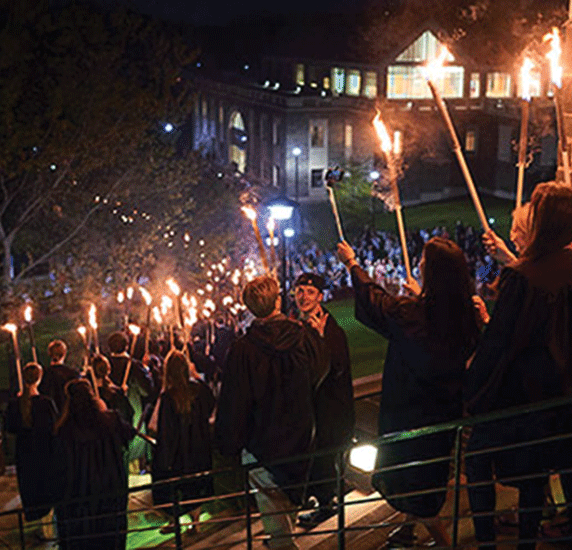Unity: More Important than Tradition

Students attempt to define “tradition” ahead of this year’s commencement.
Robes versus no robes, torches versus no torches – this is the discussion that surrounds me as the end of the school year approaches. As people bustle about in hallways, I hear phrases like, “We should just keep tradition,” or, “Did you read this article about Torchlight?” or even, “It doesn’t make any rational sense to get rid of Torchlight.” I try to keep busy and avoid the conversation, yet my mind keeps going back to this issue. It is not just a discussion with winners or losers. For me, it’s personal.
My grandmother grew up on a rural farm in Mississippi. She is the daughter of a sharecropper, the granddaughter of a slave. Her family was very poor. They lived in a tiny house, all 11 of them. They had no table to eat from; instead, they used the metal basin that they would bathe in turned over. When she was not in the fields picking cotton, she walked to her grade school five miles away because she could not ride the “white” school bus. The “colored” school she attended housed eight grades in a two-room building. She was taught to not look at a white person in the eye. Instead, she should look down and say, “yes ma’am” or “no sir.” That was not even 70 years ago. She is now 80 years old, and hopefully, when I graduate in 2017, she’ll be here at Colgate with my mom and dad watching me, a privilege she never could afford.
During her life, she saw the marches of the Ku Klux Klan (KKK). The KKK was and still is a white supremacist group that believes white power should be enforced, and that the white Christian community should come together to make a new America without everyone else who did not fit the description above. They have lynched many black Americans as well as other minorities. They bombed black churches and burned the houses of many black Americans. The KKK still exists today alongside other hate groups. They left scars of terror and oppression in the minds of many minorities, especially black Americans. Many died and suffered on their account, so it should be no wonder that many emotions are triggered by the image of students walking down the hill in robes with torches in their hands that resembles the Klan.
Let me be clear – I am not against the tradition of Torchlight, but it needs to change and evolve like many other traditions do. The real argument is not robes versus no robes, or torches versus no torches. No; it is tradition versus people. What will one lose if they change their attire or go from torches to another kind of light? Perhaps one may say the “original” tradition will change. But why do we want a tradition that causes emotional pain? Is it more important to keep a tradition or make people in our community feel like they belong here, too? We keep talking about having a rational argument about Torchlight, but how can one rationalize pain or fear? It seems to me that we forget there are real people affected by what we do, intentionally or unintentionally. We are forgetting that one’s personal “fun” is not the only thing that matters in life. We are all connected; when one of us is hurting, we should see to it that we support each other. That is what a community is, and that is what we should be. But we are not living up to this standard.
Traditions are things that bind us together, or at least they are supposed to. To unite a community in a celebration of joy as we symbolize that we are moving on from our institution. However, because of the way this celebration is converted, many students each year opt out of the ceremony citing the reason as not wanting to go through this trigger of historical pain, for them or for their families. The same is true for me. I talked to my grandmother this weekend about it and just asked one simple question, “Are you upset by this?”
“Yes,” she said. So I write this for her. She is as much a part of me as I am of her. And I am part of this community as well as the many other students who agree with me and feel pain due to this image. If we are to be united, we have to change the problem that is dividing us, and it is not the people that need to change in favor of a tradition. It is us, rather, who make the traditions and we have the power to change them, together.








